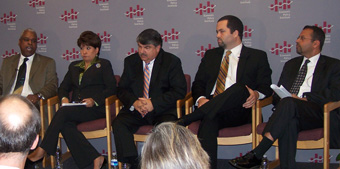The leaders of six progressive nonprofit groups convened on November 17 to warn that the country’s jobs crisis could cause severe and lasting damage to generations of Americans – particularly people of color and children. They collectively issued an Urgent Call for Action to strengthen the social safety net, extend relief to state and local governments, and adopt other policies to create public and private sector jobs.
“This Great Recession is an unfolding social catastrophe,” said Deepak Bhargava, executive director of the Center for Community Change. “If we act quickly a jobs program could put millions of people to work in 2010.”
Bhargava, who spoke at EPI’s Spotlight on the Jobs Crisis, was joined by leaders from the AFL-CIO, the Leadership Conference on Civil Rights, the NAACP, and the National Council of La Raza. All stressed that high nationwide unemployment, which reached 10.2% in October and is much higher for black and Hispanic workers, was a national crisis.
“Make no mistake. This is the civil rights issue of our time,” said Wade Henderson, president and CEO of the Leadership Conference on Civil Rights. “There can be no equal opportunity without economic justice and a stable job that provides a living wage.”

Noting that the nationwide unemployment rate is 13.1% for Hispanic workers and 15.7% for black workers, Henderson stressed that extending emergency unemployment compensation and subsidies for COBRA health insurance into 2010 was critical to the communities hardest hit by the recession. “These are people who have little if anything to sustain them,” he said.
Janet Murguia, president and CEO of National Council of La Raza, and Benjamin Todd Jealous, president and CEO of the NAACP, echoed this concern about many minority groups already seeing Depression-level rates of joblessness, but also cautioned against viewing the problems of black and Hispanic communities in isolation.
“Black people in the U.S. are the canaries in the coal mine,” said Jealous. “What we get tends to hit everybody later.”
Offering some perspective on how serious the country’s job crisis remained, EPI President Lawrence Mishel, who moderated the event, noted that in two years, unemployment is expected to be at 8%, which would still be the highest level since the early 1980s. In terms of investing in programs to save jobs and create new ones, he stressed that “keeping people employed is good for other people,” and that renewing emergency unemployment compensation could help create jobs by generating spending.
The panelists agreed that it would cost money to get people back to work, but argued the cost of doing nothing was far greater. “Doing nothing would result in a larger deficit,” said AFL-CIO President Richard Trumka.
